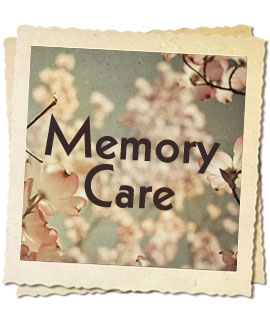According to the Alzheimer’s Association (alz.org), Alzheimer’s disease is currently the sixth-leading cause of death in the United States while also the only cause of death among the top ten in the United States that cannot be prevented, cured or even slowed. More than 5 million Americans are currently living with the disease, and every 67 seconds someone in the U.S. will develop Alzheimer’s. These are incredibly stark statistics, and dementia-related issues are an epidemic that will continue to grow among our loved ones and community members.
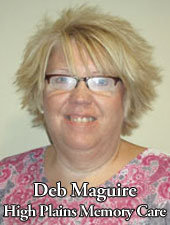 With so many people at different places in the spectrum and the extent of its far reaching effects, it makes sense that there are a wealth of options and resources available for those who are experiencing memory loss as well as their loved ones. Among these, all have one thing in common: quality of life for all who are affected. Continuing to live a meaningful life full of love and memories is crucial for those with dementia or Alzheimer’s disease. Deb Maguire, Administrator at High Plains Memory Care, details the benefits of creating “Meaningful Moments” as well as utilizing resources that are specifically designed for memory care:
With so many people at different places in the spectrum and the extent of its far reaching effects, it makes sense that there are a wealth of options and resources available for those who are experiencing memory loss as well as their loved ones. Among these, all have one thing in common: quality of life for all who are affected. Continuing to live a meaningful life full of love and memories is crucial for those with dementia or Alzheimer’s disease. Deb Maguire, Administrator at High Plains Memory Care, details the benefits of creating “Meaningful Moments” as well as utilizing resources that are specifically designed for memory care:
“At High Plains we offer our distinctive Meaningful Moments program that takes a holistic approach to caring for individuals who are struggling with memory disease and other related dementias. This program places a strong emphasis upon becoming familiar with each resident’s unique life story, honoring the person as an individual, recognizing that we are caring for the ‘whole person’; physically, socially, emotionally, and spiritually, we focus on remaining abilities while minimizing disability, we create a partnership of care that includes the resident, family members, and community staff. We understand that a person living with dementia can continue to experience life in a meaningful way using sensitivity and creativity to incorporate spontaneous moments of meaning and joy into the resident’s daily routines.
Families caring for a loved one with memory care at home is one of the hardest things you will ever do. We know that very few decisions made in life are as difficult as the one you’re facing and we want you to know we understand the challenges involved. We empathize with you and your family and are here to help. Every resident and their family have unique needs and concerns, and we hope you will consider us as a resource to help guide your decision making process. Your family deserves loving care, and we’re here to help you find the best fit. Our goal is to build a foundation that helps to create a new home setting, develop a personalized program for each resident’s specific interests and experiences, and engage residents in an array of diverse activities that continue to bring meaning and joy to their life.
Some tips that caregivers can use to cope with their responsibilities:
• Take the time to relax whenever feeling overwhelmed.
• Jot down thoughts and feelings to help acquire perspective and release emotions.
• Nourish the spirit by engaging in any activity to feel part of something greater.
• Stay social by nurturing close relationships and interacting with others.
• Maintain balance in life by doing things that are enjoyable and important.
• Schedule breaks from caregiving.
• Join or reconnect with a religious group, social club or civic organization to broaden the support network.
• Exercise regularly, eat right and get enough sleep.
Memory care can be difficult but it is also manageable and we are here to help in any way we can from being a support to you and your loved one to being a resource to help you through as things change. Our goal is the same as your goal and that is to continue to live life on your terms in a way that brings meaning and joy to everyday. Call me anytime for a free tour at (402) 483-0250.”
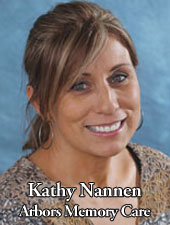 Kathy Nannen of The Arbors Memory Care Community further explains:
Kathy Nannen of The Arbors Memory Care Community further explains:
“The Arbors Memory Care Community offers the finest in memory care in an elegant and compassionate home-like setting. Every aspect of The Arbors revolves around the special needs of those with memory loss. Our caregivers understand the importance of getting to know each individual residents life story, preferences and interests as you would know a best friend and carry out the ‘Best Friends Approach’ to caregiving to enhance our resident’s quality of life. Our social program is offered seven days a week and adjusted to the needs of each person so they may experience joy, safety, and purpose in their lives. We provide a variety of activity, entertainment and daily exercise for the mind, body and soul. We open our social programming to visitors, offering a special day program for those looking into future full-time residence at the Arbors.
More than 5 million Americans are living with Alzheimer’s disease every day and millions more family and friends are caring for them. With these alarming statistics, it is important to educate ourselves on how to plan and care for persons dealing with dementia and other related issues. Know what signs and symptoms to look for and where screening and testing are provided. Know what you should be prepared for at each stage of the disease and what resources are available. Even if you do not currently have dementia or know someone who has dementia, it is very likely that within your lifetime you will know someone with some form of dementia.
Starting the conversation with family and friends early on before memory is lost is very important. Have a plan in place; delegate someone to make healthcare and financial decisions for you, along with advance directives, through a power of attorney. By planning ahead you can ensure you will get the medical care you want and relieve your caregiver of decision-making burdens during times of crisis or grief.
Preplanning can ease the stress and strain on the caregiver as well as the person receiving the care. Often the care givers health will fail faster than the person requiring care, so it is important to know what care you are capable of providing and when to get help from other resources. Quality of life often improves for persons with cognitive impairment when they are living in a memory care community. Good social programing is adapted for each individual’s abilities and allows them to be successful and to find fulfillment no matter what their limitations are.
Even after moving a loved one to a memory care community, the caregiver needs friendship and support as their loved one progresses through later stages of the disease. This disease can take its toll on the entire family. The Arbors offers a caregiver support group every third Thursday at The Legacy on 5600 Pioneers Boulevard or private family meetings by appointment at the Arbors Memory Care Community. Please feel free to contact me at (402) 466-3777 or knannen@legacyretirement.com for more information.”
Often times, understanding the journey of others who have been impacted by dementia is incredibly helpful as well. The more questions you ask, the more information you will have when it comes to making your own decisions. Stan and Mary Greenfield provided insight into their family’s experience with the Waterford Memory Care in Wilderness Hills:
“We made the right choice to move Mother to Waterford Memory Care in Wilderness Hills. This new home is a state-of-the-art facility in all aspects of care for individuals living with significant memory issues and related health concerns. As an active participant in the process of our Mother’s aging, we have come to deeply appreciate the excellent standard of care we have observed at Waterford Memory Care.
While the facility is one of the finest in this area, the professional staff is a value-added gift to residents and families. They are competent, caring, highly-skilled, and marvelously communicative. It is amazing that they take time to speak with us daily through a personal contact sharing updates on Mother’s progress and/or adjustment. This extra effort is precious to us and is far beyond any previous experience at this level.
Mother’s care is highly individualized to meet her daily needs. We are confident that she is safe and secure, and professional staff is highly-visible and always available. While she is quite advanced in both age and disease, she is consistently treated with consummate respect and dignity. To us, this is a gift beyond measure. Thank you, Care Staff. You are highly-valued and so very appreciated!
The environment within the Waterford Memory Care is carefully and intentionally created. It is inclusive and authentic in its approach to all residents and guests. We have spent many, many hours at the facility, both as volunteer and family of a resident, and we have found that each and every person is treated as a special guest with unique and varying needs. Staff is attuned to each individual and provides consistent, extraordinary care. The warm community setting gives a feel of home with
• Safe and secure emotional and physical environment;
• Personal choices that allow individuals a continuum of options for mealtime, bedtime, activity time, etc.;
• Meaningful activities, both individual and group, that appeal to interests and abilities of residents; and
• A broad continuum of medical and support services based upon individual need.
The staff at Waterford Memory Care in Wilderness Hills has consistently demonstrated a positive partnership with us as together we strive toward a home-like setting that is loving, caring, compassionate, and respectful. The environment honors the stories, the histories, and the dignity of each individual. We are deeply grateful to the staff for their gifted talents and abilities to skillfully and competently provide for our loved one, our Mother.”
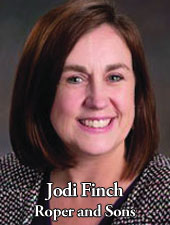 Planning for the future isn’t just “in case of emergency”; it should cover everything in as much detail as possible from tomorrow to arrangements after passing on. “There are many plans and things to have in place when considering the end of our life, regardless of whether issues of memory capabilities are involved,” says Jodi Finch of Roper & Sons Funeral Care. “We need to plan for our healthcare wishes, plan how we want to be remembered at the celebration of our life, and plan for distributing our financial and sentimental assets.
Planning for the future isn’t just “in case of emergency”; it should cover everything in as much detail as possible from tomorrow to arrangements after passing on. “There are many plans and things to have in place when considering the end of our life, regardless of whether issues of memory capabilities are involved,” says Jodi Finch of Roper & Sons Funeral Care. “We need to plan for our healthcare wishes, plan how we want to be remembered at the celebration of our life, and plan for distributing our financial and sentimental assets.
Our lives are full of memories, and mementos, those things that mean something to us and help identify who we are and what impact we made in the world. During times of transition – whether that means moving from a large home to a smaller one, moving from home to a facility, or at the time of passing, it is important to be able to make decisions about passing along our memories and mementos to our loved ones. We encourage people to do this in a thoughtful and meaningful way, and in order to do that, it is important that it take place before mental capacity diminishes.
We need to make decisions about our healthcare wishes, and let them be known in a way that will stand up in a medical setting (i.e., choose a healthcare power of attorney). By making these decisions, we relieve our family of the burden of making choices they are unsure about making or simply cannot make emotionally.
We also need to make decisions about how we wish to be remembered, whether that means a traditional funeral, a Celebration of Life, or some other memorial service, and what should be involved in that ceremony. When making these decisions, keep in mind that a funeral or memorial service gives our families and other loved ones a sense of closure, and a way to say their ‘final goodbye’, and personalizing it makes it much more real and fulfilling.”
She further explains, “ It is very important to have plans for your funeral or memorial celebration in place before mental capacities diminish so that your family knows your wishes and understands that you made the decision on your own without being unduly influenced. Oftentimes, memories of a loved one’s wishes contradict each other, so when you make your arrangements ahead of the time of need, and while your memory is sharp, you save your family from bitter emotions and disagreements. This applies not only to funeral wishes, but to distribution of property and health care decisions as well.
Communication is key in ensuring that everyone receives the items that are most meaningful, and that peace is kept among family members and other loved ones. It is important to do all of these things while we still have our full mental faculties so that our desires are expressed as plainly and concisely as possible, and so that there is no question that they are truly our own wishes without any undue pressure or coercion. When these plans are written, signed, dated and kept in a safe place, it is less likely that there will be disputes over your directions in the event you develop memory concerns.
It is always best if you can make your own plans, but include your family in the discussion. Decide together how to best express the life you lived, and allow everyone who wishes to have a say. If you need help with any of these plans, or have questions about the best way to approach subjects that can be sensitive, please contact us at (402) 476-1225. We are more than happy to have you meet with a funeral director or family service counselor who can offer insight and assistance.”
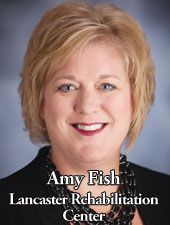 “It’s important for everyone to look ahead and plan for the future,” Amy Fish, Administrator at Lancaster Rehabilitation Center, also emphasizes. “Family members should be made aware of your directives as it relates to health care, so that if or when the time comes that decisions must be made on your behalf, they honor your wishes. Formal documents such as a Living Will or Advanced Directives help family members and health care providers care for you as you desire.”
“It’s important for everyone to look ahead and plan for the future,” Amy Fish, Administrator at Lancaster Rehabilitation Center, also emphasizes. “Family members should be made aware of your directives as it relates to health care, so that if or when the time comes that decisions must be made on your behalf, they honor your wishes. Formal documents such as a Living Will or Advanced Directives help family members and health care providers care for you as you desire.”
She continues, “The memory care neighborhood at Lancaster Rehabilitation is staffed 24-hours a day with professional nurses who are specially trained in Alzheimer’s and related disorders. Our memory care neighborhood is designed with activity programs specified to meet the individual needs of those we serve. Our beautiful terrace provides a relaxing space for residents to enjoy the outdoors–our resident’s safety and security is protected with our secure egress, while providing access to a secure outdoor courtyard and garden. Our flexible activity program of cultural, recreational, educational and social programs will help your loved one stay engaged in body, mind and spirit.
Furthermore, the support and services provided at Lancaster Rehabilitation do not end with our residents; we are just as dedicated to helping loved ones stay healthy and involved in the caregiving experience. The Alzheimer’s Support Group at Lancaster Rehabilitation meets the second Tuesday of every month at 4:00 p.m. Community and family members are welcome to join us anytime to learn more about the disease process, or to just take a break and enjoy the company of others.
The team at Lancaster Rehabilitation recently received a perfect survey from the Department of Health and Human Services, and we’re certainly proud of the exceptional care and services provided in our traditional nursing, rehabilitation, and memory support neighborhoods. Stop by to tour Lancaster Rehabilitation whenever you wish. We’re anxious to show off all that’s new on our campus!”
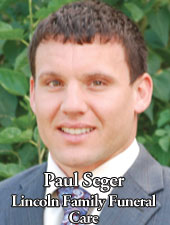 No matter what arrangements need to be made, being prepared will make everything so much easier on everyone involved. Paul Seger, Funeral Director at Lincoln Family Funeral Care, says, “From my experience, one thing that is commonly forgotten that seems like it wouldn’t be are the full names of the parents of the person with memory loss—a lot of times living family members may only know their first names. On legal documents that is a question that is asked, and most often not 100% sure on the answer. Vital statistical information is something that can be written down and saved in a file to help answer the questions that people may not remember down the road.
No matter what arrangements need to be made, being prepared will make everything so much easier on everyone involved. Paul Seger, Funeral Director at Lincoln Family Funeral Care, says, “From my experience, one thing that is commonly forgotten that seems like it wouldn’t be are the full names of the parents of the person with memory loss—a lot of times living family members may only know their first names. On legal documents that is a question that is asked, and most often not 100% sure on the answer. Vital statistical information is something that can be written down and saved in a file to help answer the questions that people may not remember down the road.
Another important item that can be forgotten is their stories. Many stories are lost if they are not written down or told to someone else. Examples of meaningful stories would be how they met their spouse, stories from growing up, etc.
To honor those special memories, we are trying to help families with that aspect and are working to create a memorial in movie form. We plan to visit the person and have him/her just talk to us (and the camera) about these stories, and once these special life moments and stories are captured we would keep the footage on file. In the future, these stories could be burned to a DVD for family to hold on to for years to come.”
Especially regarding the importance of planning for the future, including end of life arrangements, Seger explains, “The benefit of pre-planning your services before a person experiences memory loss is the satisfaction of knowing that you have everything done exactly how you want. This might include things such as a casket in your favorite color, specific music playing during the visitation, an open house if memorial services aren’t what you are looking for, and so on.
Also, by planning ahead for funeral arrangements it will take a lot of burden off of your family. I hear time after time that with having all arrangements made ahead of time it puts the family at ease, allowing them to grieve. As far as pre-planning goes you can have simple information such as vital records and family information filled out and filed at the funeral home, or you can have the whole service planned out with music selections and everything complete. Pre-planning can also be done in stages, so you can be completely comfortable with all of the decisions you are making.
Pre-planning can also be put into an irrevocable funeral policy so the money is safe for years to come. This is important because if your family member must be placed in a memory facility, that money is safe for funeral services and cannot be used elsewhere.”
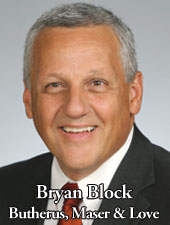 In agreement about the importance of planning for the future, Bryan Block of Butherus, Maser & Love shares one of his experiences:
In agreement about the importance of planning for the future, Bryan Block of Butherus, Maser & Love shares one of his experiences:
“Over the 4th of July weekend in 2011 a good friend of our family passed away in Omaha. Marilyn had been in poor health for a number of years and her memory had been deteriorating for a couple of years. Through it all the family had never addressed the funeral wishes of Mom and Dad. They had three children, two of whom lived out of town, and everyone was so happy that Marilyn was able to stay at home and have her husband as her caregiver. On that unfortunate weekend they found that Dad had passed away in the basement in front of a baseball game leaving Marilyn in the care of … ??… who? The kids had to make immediate guesses on the type of service arrangements to make for Dad because Mom was no longer able to assist with those decisions. In addition to funeral arrangements, they also had to deal with living arrangements for their mother and on top of everything else it was taking place on a holiday weekend. They walked away from the funeral a few days later saying what we hear families say all too often: ‘I hope that’s what dad would have wanted.’ In addition to the benefits of pre-planning funeral arrangements, you might also consider spending some time with your parents and encourage them to write out memories of their life–childhood memories, dating, raising children, travels, etc. Many of these memories will never be known or passed on to successive generations unless they share the stories while they have the ability to do so. While you’re at it, do the same for yourself. We do group presentations on a regular basis to assist people with starting on their autobiography. It can be as detailed as you would like it to be and we have a workbook that will help you get started. Don’t leave your family wondering if the arrangements they make for you are what you would have wanted. Make sure they remember you in gratitude for having everything in order and taken care of for them.”
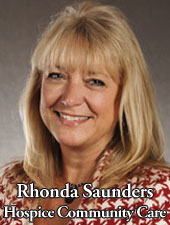 Depending on where your loved one is at on their path, hospice care may also be an extremely helpful resource to utilize. Rhonda Saunders, Director of Marketing at Hospice Community Care of Nebraska, adds, “As a hospice provider, Hospice Community Care reaches out to people with all types of life limiting illnesses. Due to the fact that Dementia and Alzheimer’s are terminal diseases, we see this fairly often. Hospice care is about using a team oriented approach. At Hospice Community Care, our team is made up of a Medical Director, Nurse Practitioner, Nurses, Home Health Aides/CNA’s, Social Workers, Chaplains, Nutritionist and Volunteers. All of which are trained and skilled at meeting the specialized needs of the hospice patient with dementia.
Depending on where your loved one is at on their path, hospice care may also be an extremely helpful resource to utilize. Rhonda Saunders, Director of Marketing at Hospice Community Care of Nebraska, adds, “As a hospice provider, Hospice Community Care reaches out to people with all types of life limiting illnesses. Due to the fact that Dementia and Alzheimer’s are terminal diseases, we see this fairly often. Hospice care is about using a team oriented approach. At Hospice Community Care, our team is made up of a Medical Director, Nurse Practitioner, Nurses, Home Health Aides/CNA’s, Social Workers, Chaplains, Nutritionist and Volunteers. All of which are trained and skilled at meeting the specialized needs of the hospice patient with dementia.
An individual with advanced dementia cannot report their symptoms. As a result these symptoms are often left untreated, leaving them vulnerable to pain, difficulty breathing and various other conditions. This is where hospice can help! Hospice is a covered benefit under Medicare Part A and under many private insurance plans. A person is eligible for hospice care when a physician determines that they have less than six months to live if the disease continues to follow its natural course of progression. For a person with dementia to qualify for hospice care, they must score a seven or above on the Functional Assessment Staging Tool, which means they: cannot dress themselves; cannot walk without assistance; cannot bathe properly without assistance; are incontinent of urine and stool; and are unable to speak or have meaningful communication.
Other medical complications, such as multiple hospitalizations, recurrent infections (i.e. urinary tract infections, blood infections), aspiration pneumonia (resulting from choking on food or fluids), pressure sores on the skin, and refusal to eat help support a life expectancy of six months or less.
Hospice is a key provider of palliative care for people who are near end of life. Research has shown that terminally ill patients and their families benefit from hospice by experiencing better pain control, fewer terminal hospitalizations and invasive treatments, and greater overall satisfaction with end-of-life care.”
She further explains, “Hospice care is not just for the person who’s facing a life limiting illness, but it includes their family as well. At Hospice Community Care we embrace everyone that is a part of our patient’s support system. The benefits to our families are:
• Respite care so families can take a break from caregiving.
• Volunteers to assist with errands, lend a listening ear, or give a hug. Someone to stay with the patient while the caregiver goes to lunch, shopping, etc.
• Counseling, which includes spiritual and emotional, as well as advise on practical matters related to caregiving.
• Bereavement support to help the family through their period of mourning.
• And most of all, support and assistance from our caring team of professionals who consider our patients and the family to be the most important members of our team!
It’s important to remember that you are not alone. Dealing with facing the loss of a loved one is never easy. Our Hospice Community Care team is available at all times to provide physical, spiritual and emotional support throughout this journey. If you would like more information on hospice, dementia or other related topics and/or would like a speaker for your organization or group, please contact me anytime at (402) 405-1797.”
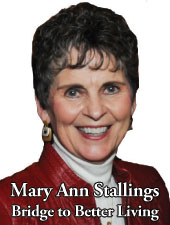 Mary Ann Stallings of Bridge to Better Living also emphasizes the importance of finding resources that can provide the answers to the questions you have:
Mary Ann Stallings of Bridge to Better Living also emphasizes the importance of finding resources that can provide the answers to the questions you have:
“How DO we deal with our loved one who is no longer the person we once knew? What should we do? Where should we go? They will be angry with us if we move them, but the caregiver who is up 24/7 is wearing out and we need to think of them, too. Are we making the right move?”
These are many of the questions families who are affected by the dreaded disease have when they meet with Bridge to Better Living. Dementia and Alzheimer’s are the hardest situations because of the emotional and guilty feelings the families often have.
Bridge to Better Living is able to walk the family through the process of finding the perfect fit for their loved ones at NO cost. This includes the important first contact, tours, and being their own personal representative. After the families are shown various options Bridge to Better Living is able to provide a comparison database. It is very important a person with dementia or Alzheimer’s hopefully makes only one move. Our services narrow down the communities that will fit their needs and we provide access to:
• Actual provided amenities and services
• Hands-on information • Prices, locations, sizes of apartments
• Support before, during, and after the move
We are there to listen, to provide emotional support, and refer to community resources for support before, during the transition and after their loved one has moved. Having ‘been there and done that’, we realize how important it is to have someone beside you on this journey.”
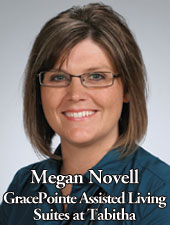 Megan Novell of GracePointe Assisted Living Suites at Tabitha adds, “Every person with memory loss goes down his/her own path; no path is the same. Having an awareness of memory related issues helps everyone involved. It allows caregivers to know what signs to look for and helps tremendously with assessment and finding the right fit for services. It also helps the individual and their family in making an educated decision as to what services would be most appropriate at every new stage they go through in their path.
Megan Novell of GracePointe Assisted Living Suites at Tabitha adds, “Every person with memory loss goes down his/her own path; no path is the same. Having an awareness of memory related issues helps everyone involved. It allows caregivers to know what signs to look for and helps tremendously with assessment and finding the right fit for services. It also helps the individual and their family in making an educated decision as to what services would be most appropriate at every new stage they go through in their path.
GracePointe suites offer two floors of specialized memory care, including 48 beautiful studio and one bedroom suites. Floors are secured environments designed especially for memory care with small neighborhoods and areas specifically for reminiscing. Family members are ALWAYS welcome in our community; we don’t have specific guest hours because routine is important. For example, family members join activities and dinner on a regular basis, but if they are used to having coffee at 5 am with their loved one on Tuesdays, this still continues.
We always offer care and assistance even during visits to allow family and friends to make meaningful memories as opposed to wearing themselves out. For those who are caregivers, it is important to take care of yourselves too! Services are available in many forms and Tabitha along with many others in the Lincoln community offer a wealth of resources. Support groups and the Alzheimer’s Association are a wonderful resource for those who have been affected by this widespread disease.”
She further explains, “When it comes to having plans in place, the more you have in place ahead of time the easier the future will be. Appointing a power of attorney so everyone knows who can make decisions on behalf of that person is crucial. That POA needs to have those difficult conversations; health conditions, documents, end of life wishes– the more information that is shared and in writing is best. As memory loss progresses it can become be a really stressful time for everyone, and often times VERY difficult decisions need to be made and disagreements do happen.
Be proactive, and make sure to utilize your resources. Know what services are available so you get to choose instead of settling with whatever is available at the moment. There truly are so many choices, and even if we’re not the choice we are still available to help you in navigating the journey. Simply having a conversation will allow you to understand what is out there for you and your family.”
Dealing with something so devastating with no cure is challenging, but through research and ongoing efforts some connections have been made. Hearing loss can be very isolating, and there are several studies that suggest that seniors with hearing loss are more likely to develop dementia over time than those who retain their hearing. The findings from John Hopkins and the National Institute on Aging suggests this could lead to new ways to combat dementia, which affects millions of people worldwide and carries heavy social burdens. Although the link between the two conditions is unknown, researchers suggest that a common pathology may underlie both or that the strain of decoding sounds over the years may overwhelm the brains of people with hearing loss, leaving them more vulnerable to dementia. They also speculate that hearing loss could lead to dementia by making individuals more socially isolated, a known risk factor for dementia and Alzheimer’s.
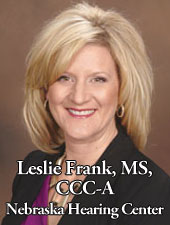 “Hearing loss is a slow process and sometimes ignored,” Leslie Frank MS, CCC-A of Nebraska Hearing Center says. “Even if people feel they aren’t affected, this study shows that it may be a more serious problem”.
“Hearing loss is a slow process and sometimes ignored,” Leslie Frank MS, CCC-A of Nebraska Hearing Center says. “Even if people feel they aren’t affected, this study shows that it may be a more serious problem”.
One small study investigated hearing aid use and cognition in elderly adults. A group of 12 adults was divided into three subgroups: normal hearing, hearing loss without use of hearing aids, and hearing loss with use of hearing aids. The group who had hearing loss without hearing aid use showed the lowest scores on the Wechsler Intelligence Scale-Revised, while there were no differences in the normal hearing and hearing loss with hearing aid use groups. There is increasing evidence of a link between untreated hearing loss and dementia. Whatever the cause, the scientists report their finding may offer a starting point for interventions – even as simple as hearing aids – that could delay or prevent dementia by improving patients’ hearing. “We are lucky to live in such an exciting time where technology is constantly improving”, says Leslie. “Hearing devices today are not your Grandma’s hearing aids. They are small, and the clarity is amazing. We have devices that sync to your iPhone where you can stream music and phone calls right to the aids. No one needs to know you have hearing devices unless you want them too.”
Furthermore, prevention is key when it comes to your hearing; always use hearing protection when mowing or vacuuming and make sure to get your hearing tested on an annual basis. “We strongly encourage annual testing. Once your baseline is set, your hearing can be monitored. It makes sense to be proactive since the test is always free at Nebraska Hearing Center,” says Leslie.
According to the John Hopkins study, people suffering with severe hearing loss, were five times more likely to develop dementia than those with normal hearing.
Some of the warning signs to look for are:
• You hear loud enough, but can’t understand conversations
• You overuse the word “what”
• You turn up the TV too loud for others
• You can’t understand conversation in a noisy environment, like a restaurant
• You have ringing in your ears
“I urge people to pay close attention to their hearing and to have it checked annually just like any other annual checkup,” Leslie says. “The ability to communicate with the help of hearing aids can help enhance quality of life for individuals with Alzheimer’s and their caregivers.”
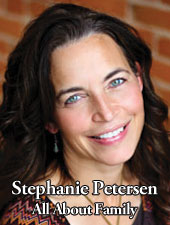 For those who wish to stay in their own homes as long as possible, and for caregivers who are in need of respite, in-home assistance is another incredibly useful option that is available. Stephanie Petersen, owner of All About Family, says, “Our company provides in-home care assistance for those with or without neurological diseases. We all have experience with dementia and Alzheimer’s disease, which is helpful. In-home care assistance relieves some stress on caregivers, especially if they are family. When it comes to neurological diseases, a lot of times personalities are not what they used to be. It is very important to understand that the person we meet is not the one that the caregivers ‘know’. Our staff does not judge behaviors, and we love them just the way that they are! We really do become part of the family.
For those who wish to stay in their own homes as long as possible, and for caregivers who are in need of respite, in-home assistance is another incredibly useful option that is available. Stephanie Petersen, owner of All About Family, says, “Our company provides in-home care assistance for those with or without neurological diseases. We all have experience with dementia and Alzheimer’s disease, which is helpful. In-home care assistance relieves some stress on caregivers, especially if they are family. When it comes to neurological diseases, a lot of times personalities are not what they used to be. It is very important to understand that the person we meet is not the one that the caregivers ‘know’. Our staff does not judge behaviors, and we love them just the way that they are! We really do become part of the family.
Caregivers need affirmation that they are absolutely doing the best they can. There is a time to be family and a time to be a caregiver. As the main caregiver, the individual likely has very little time to focus on enjoying their family members. We assist with ADL’s (activities of daily living), which might include light housekeeping, laundry, errands, and truly anything else they need. Caregivers who try to do it all often end up getting stressed and eventually suffer from extreme lethargy and/or sickness of some kind themselves. I named the company All About Family because we take care of the whole family. We offer handyman/maintenance services as well so that if the one whom did minor repairs around the house is the one that has gotten sick, those things can be taken care of.”
She adds, “It is important to have in place, and in writing if possible, your loved one’s wishes for the future. For example: Do they want to go to an Assisted Living Facility (ALF) or Skilled Nursing Facility (SNF) vs. in-home care? Compare pricing and their wishes to make the decision. Funeral arrangements can be a hard conversation to have sometimes, but it really is the best gift to give you and your family. If you hear this information from them personally, you KNOW you are carrying out their wishes. I have been a nurse 20 years and the last ten have had significant contact with ALF/SNF’s in Lancaster and surrounding counties as well as funeral homes. I can assist and guide the family through those hard decisions if necessary.”
There are in-home care companies that provide non-medical services, but also those who do offer home-based medical care. Health at Home Consultants specializes in bringing high quality, cost effective health care to seniors in their home environment. Their Nurse Practitioners act as your partner in health—if you are unable to get yourself or your family member to the clinic, they bring the clinic to you!
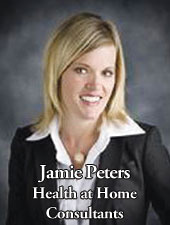 “As a Nurse Practitioner group that focuses the practice in the home, Health at Home Consultants has great success with memory care clients as these individuals are able to remain in their homes where they feel comfortable and safe,” says Jamie Peters, APRN of Health at Home Consultants. “Moreover, we have an awareness of the disease process that is crucial to ensuring that the appropriate services and care are in place. We’ve found that traveling to a dementia resident is extremely helpful so that the loved ones and caregivers are not exposed to any inconvenience or difficulty associated with getting cooperation by the cognitively impaired individual.
“As a Nurse Practitioner group that focuses the practice in the home, Health at Home Consultants has great success with memory care clients as these individuals are able to remain in their homes where they feel comfortable and safe,” says Jamie Peters, APRN of Health at Home Consultants. “Moreover, we have an awareness of the disease process that is crucial to ensuring that the appropriate services and care are in place. We’ve found that traveling to a dementia resident is extremely helpful so that the loved ones and caregivers are not exposed to any inconvenience or difficulty associated with getting cooperation by the cognitively impaired individual.
The best approach is to know as much as possible about options that are available as you age–Home Care vs Assisted Living vs Memory Care and so on. The main things to know are the level of care needed and what every community has to offer. A member of the Health at Home Consultants team would be happy to visit with you and your family about the options that are available; contact our office today at (402) 421-1420.”
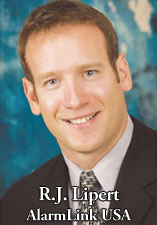 If individuals with memory loss are able to continue to live in their own home, ensuring their continued safety is paramount and it’s also important to a system in place for when emergency situations arise. AlarmLink USA provides a host of reliable security and emergency systems, including the AlarmLink Medical Alert, which is especially popular among seniors and truly is a life saver. RJ Lipert, owner of AlarmLink USA, explains, “We have an array of products and services that can be tailored to fit the needs and lifestyles of seniors, including those who are experiencing issues related to memory loss. Our most popular is the Personal Emergency Reporting System, which is a supervised wireless emergency reporting product. The transmitter is convertible, meaning that we can install it in a wristband or a pendant in addition to options for table-top or wall-mount consoles. This system offers 24/7 emergency monitoring from the staff at AlarmLink USA, 2-way voice capabilities, smoke detection, and it’s also waterproof. In fact, we recently received this testimonial from one of our clients:
If individuals with memory loss are able to continue to live in their own home, ensuring their continued safety is paramount and it’s also important to a system in place for when emergency situations arise. AlarmLink USA provides a host of reliable security and emergency systems, including the AlarmLink Medical Alert, which is especially popular among seniors and truly is a life saver. RJ Lipert, owner of AlarmLink USA, explains, “We have an array of products and services that can be tailored to fit the needs and lifestyles of seniors, including those who are experiencing issues related to memory loss. Our most popular is the Personal Emergency Reporting System, which is a supervised wireless emergency reporting product. The transmitter is convertible, meaning that we can install it in a wristband or a pendant in addition to options for table-top or wall-mount consoles. This system offers 24/7 emergency monitoring from the staff at AlarmLink USA, 2-way voice capabilities, smoke detection, and it’s also waterproof. In fact, we recently received this testimonial from one of our clients:
“My Mother fell about 1:15 am and we received a call from the response center telling us she had fallen and they sent lift assist. The response center caller was polite, professional and calm as my first reaction was panic–Mom is hurt. She said Mom had told her she was not hurt, just could not get up. She asked me to confirm location of key to gain access to the home and I did so. I am so happy we have AlarmLink for my Mom and Dad. We know if they do fall they can just push a button, we will be contacted and help will be on the way to their home. This is real peace of mind for their families. Thank you so much!”
– Sharon H.
Because the lives and assets of our clients are at stake, we are committed to the flawless execution of our systems. We would be happy to provide more information on the various options for seniors and a free estimate on any of these products. At AlarmLink USA, we take great pride in knowing that we play a role in keeping seniors safe and secure in their home, wherever that may be.”
By 2050, the number of people age 65 and older with Alzheimer’s disease may nearly triple, from 5 million to as many as 16 million, if no advances have been made to slow or stop the disease. This impact on us as caregivers is huge as well as the sheer cost of care. In 2013, 15.5 million family and friends provided 17.7 billion hours of unpaid care to those with Alzheimer’s and other dementias—care valued at $220.2 billion. This takes a huge toll on families of those with dementia and causes a ripple effect—due to the physical, emotional and financial burden of being a caregiver, these folks had $9.3 billion in additional health care costs of their own in 2013. This is by far the most expensive condition in the nation, and will likely affect each and every one of us at some point in our lives. There are so many dedicated professionals and local resources available to help you navigate through this journey, and we encourage you to reach out, educate yourself, and be proactive in planning for yourself or your loved ones.

